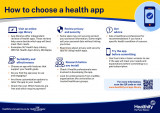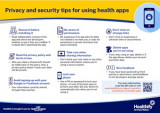If you're a frequent visitor to Healthify, why not share our site with a friend? Don't forget you can also browse Healthify without using your phone data.
Psoriasis apps
Psoriasis apps
- There are variety of mobile apps available for people with psoriasis.
- They can help you improve self-management of your condition by helping you keep track of your symptoms, triggers and medicines.
- Find out more about psoriasis apps and how to use them safely.

Psoriasis is a chronic (ongoing) inflammatory skin condition that causes red, flaky patches of skin covered with silvery scales. Read more about psoriasis.
Psoriasis apps have the potential to help you manage your condition better.
- They can help you keep track your symptoms and triggers, and monitor or set reminders for your medicines.
- The information recorded by the apps can help your doctor or specialist to understand your triggers and review the impact of medications on your condition.
- Living with a chronic, visible skin disease can affect your quality of life. Some apps can provide information and advice about living with psoriasis, and some provide an online community to connect with other people with psoriasis.
- It's important not to rely on the app for a diagnosis – this is a condition which must be diagnosed by a doctor (usually a GP or dermatologist).
Here are some tips on how to use psoriasis apps safely.
How to use psoriasis apps safely
Do (✔)
- Always use psoriasis apps under the supervision of a healthcare provider so they can guide you on whether the app is suitable for your needs and can direct you to appropriate treatment options for your condition.
- Use an app to keep track of your symptoms as part of your management plan. Use graphs and reporting for a discussion with your healthcare provider.
- Be careful when reading information on discussion boards or group chat rooms. Some apps have interactive features where users can share their experiences. Be cautious because in most cases these aren't monitored by a health professional so the advice or suggestions may not be safe or effective.
- Know when to seek help.
Don’t (✘)
- Rely on apps to make a diagnosis of your condition.
- Use treatments without first seeking medical and professional advice.
- Make changes to your medicines based on the recommendations from the app.
Before choosing an app, think about how it will benefit you and what you want it to be able to do.
- An app will only be helpful if you use it, so it needs to be something you like using and find easy to use.
- If you find the app difficult to use, or you don't like the imagery or look of it, or the language it uses, you may want to find another one that suits you better.
- Check how your data is collected, stored and used in the app, including whether it’s shared with or sold to third parties.
- For more guidance on how to choose health apps, see how to choose a health app.
- It's important to remember that apps don’t replace professional help or your doctor’s advice.
| App | Features | Clinical review |
|
|
|
|
|
|
|
|
Disclaimer: The NZ Health App Library is a free consumer service to help you decide whether a health app would be suitable for you. Our review process is independent. We have no relationship with the app developers or companies and no responsibility for the service they provide. This means that if you have an issue with one of the apps we have reviewed, you will need to contact the app developer or company directly. |
Factsheets – using health apps safely

How to choose a health app
Healthify He Puna Waiora, NZ

Privacy and security tips for using health apps
Healthify He Puna Waiora, NZ
Credits: Healthify editorial team. Healthify is brought to you by Health Navigator Charitable Trust.




